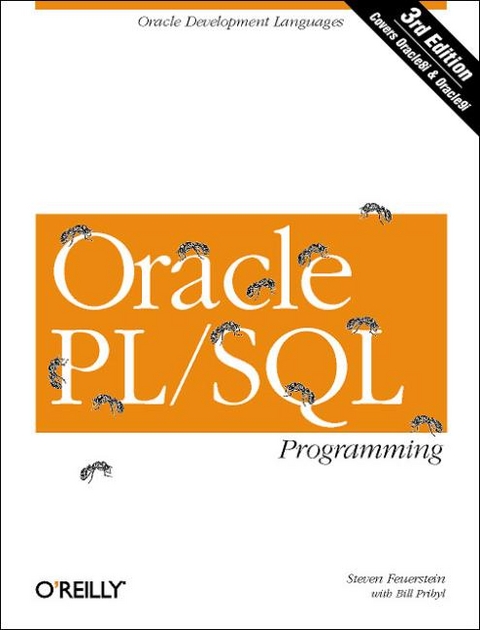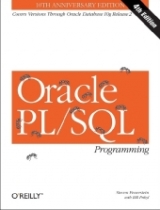
Oracle PL/SQL Programming
O'Reilly Media, Inc, USA (Verlag)
978-0-596-00381-4 (ISBN)
- Titel ist leider vergriffen;
keine Neuauflage - Artikel merken
Beginning with an introduction to PL/SQL programming and continuing through advanced PL/SQL topics, the book covers: PL/SQL language fundamentals; PL/SQL program structure; types of program data; the connection of PL/SQL to the underlying database; application construction; managing your PL/SQL code base; if you're new to PL/SQL, reading this book will improve your skills and help your understanding. If you're already a proficient PL/SQL programmer, you'll be able to extract particular techniques for immediate application. Whether you use this book as a teaching guide or reference, you'll find it will have a significant impact on your ability to use PL/SQL more effectively.
Steven Feuerstein is considered one of the world's leading experts on the Oracle PL/SQL language. He is also the author of the sequel to Oracle PL/SQL Programming, Advanced Oracle PL/SQL Programming with Packages (O'Reilly & Associates, 1996), and Oracle Built-in Packages (O'Reilly & Associates, 1998). Steven has been developing software since 1980 and worked for Oracle Corporation from 1987 to 1992. He is a partner with RevealNet, Inc. (www.revealnet.com) and is the chief architect of the RevealNet products, PL/SQL Knowledge Base and PL/Vision (a code library of prebuilt PL/SQL packages that accelerates PL/SQL-based application development). Steven also sysops RevealNet's "PL/SQL Pipeline," an online community for PL/SQL developers (www.revealnet.com/plsql-pipeline). He can be reached through email at feuerstein@revealnet.com. Steven is also president of PL/Solutions, which offers training and consulting on both PL/Vision and PL/SQL (www.plsolutions.com). Finally (on the Oracle side of Steven's life), he serves as codirector of the Oracle Practice at SSC, a systems management consulting firm based in Chicago (www.saraswati.com). Steven shares his Rogers Park, Chicago, Georgian with his wife Veva, his youngest son Eli, two cats (Sister Itsacat and Moshe Jacobawitz), and Mercury (the Congo Red African Gray parrot). His older son, Chris, is busy making music and creating art nearby. Steven is a member of the Board of Directors of the Crossroads Fund, which provides grants to organizations in Chicago working for social change. Bill Pribyl, author, teacher, and software consultant, is coauthor of the best-selling Oracle PL/SQL Programming and its companion pocket reference, both published by O'Reilly & Associates. An Oracle user for 15 years, Bill has consulted on many aspects of using Oracle products. He recently spearheaded PLNet.org, a Web-based repository where developers can share open source PL/SQL. At home in Houston, Bill volunteers with a Christian organization teaching computer skills to low-income clients, and he says his next project will be persuading fellow database technologists to contemplate the ethical and moral implications of all their work. Visit Bill at www.datacraft.com.
Preface Part I. Programming in PL/SQL 1. Introduction to PL/SQL What Is PL/SQL? The Origins of PL/SQL So This Is PL/SQL About PL/SQL Versions Resources for PL/SQL Developers Some Words of Advice 2. Creating and Running PL/SQL Code SQL*Plus Performing Essential PL/SQL Tasks Oracle's PL/SQL-Based Developer Tools Calling PL/SQL from Other Languages And What Else? 3. Language Fundamentals PL/SQL Block Structure The PL/SQL Character Set Identifiers Literals The Semicolon Delimiter Comments The PRAGMA Keyword Labels Part II. PL/SQL Program Structure 4. Conditional and Sequential Control IF Statements CASE Statements The GOTO Statement The NULL Statement 5. Iterative Processing with Loops Loop Basics The Simple Loop The WHILE Loop The Numeric FOR Loop The Cursor FOR Loop Loop Labels Tips for Iterative Processing 6. Exception Handlers How PL/SQL Deals with Errors Defining Exceptions Raising Exceptions Handling Exceptions Part III. PL/SQL Program Data 7. Working with Program Data Naming Your Program Data Overview of PL/SQL Datatypes Declaring Program Data Programmer-Defined Subtypes Conversion Between Datatypes 8. Strings The Impact of Character Sets String Datatypes String Issues String Functions NLS Functions 9. Numbers Numeric Datatypes Number Conversions Numeric Functions 10. Dates and Timestamps Date and Time Datatypes Date and Timestamp Conversions Date/Time Arithmetic Date/Time Functions 11. Records and Collections Records in PL/SQL Collections in PL/SQL Declaring Collection Types and Collections Where Collections Can Be Used Collection Built-Ins (Methods) Working with Collections Collection Pseudo-Functions Maintaining Collections Choosing a Collection Type 12. Miscellaneous Datatypes The BOOLEAN Datatype The RAW Datatype The UROWID and ROWID Datatypes The LOB Datatypes Working with LOBs Predefined Object Types Part IV. SQL in PL/SQL 13. DML and Transaction Management DML in PL/SQL Bulk DML with the FORALL Statement Transaction Management Autonomous Transactions 14. Data Retrieval Cursor Basics Working with Implicit Cursors Working with Explicit Cursors BULK COLLECT SELECT...FOR UPDATE Cursor Variables Cursor Expressions (Oracle9i) 15. Dynamic SQL and Dynamic PL/SQL NDS Statements Multirow Queries with Cursor Variables Binding Variables Working with Objects and Collections Building Applications with NDS NDS Utility Package Comparing NDS and DBMS_SQL Part V. PL/SQL Application Construction 16. Procedures, Functions, and Parameters Modular Code Procedures Functions Parameters Local Modules Module Overloading Forward Declarations Advanced Topics Go Forth and Modularize! 17. Packages Why Packages? Rules for Building Packages Rules for Calling Packaged Elements Working with Package Data When to Use Packages Packages and Object Types 18. Triggers DML Triggers DDL Triggers Database Event Triggers INSTEAD OF Triggers AFTER SUSPEND Triggers Maintaining Triggers 19. Managing PL/SQL Applications Managing and Analyzing Code in the Database Protecting Stored Code Using Native Compilation Testing PL/SQL Programs Debugging PL/SQL Programs Tuning PL/SQL Programs Improving Application Performance Part VI. Advanced PL/SQL Topics 20. PL/SQL's Runtime Architecture Looking Under the Hood Dependency Management PL/SQL's Use of Memory in the Oracle Server The Processing of Server-Side PL/SQL PL/SQL Code on the Client Execution Authority Models Hardware for PL/SQL: Bigger = Better? What You Need to Know 21. Object-Oriented Aspects of PL/SQL Introduction to Oracle's Object Features An Extended Example Object Views Maintaining Object Types and Object Views Pontifications 22. Calling Java from PL/SQL Oracle and Java Getting Ready to Use Java in Oracle A Simple Demonstration Using loadjava Using dropjava Managing Java in the Database Using DBMS_ JAVA Publishing and Using Java in PL/SQL 23. External Procedures Introduction to External Procedures The Oracle Net Configuration Creating an Oracle Library Writing the Call Specification Raising an Exception from the Called C Program Nondefault Agents Maintaining External Procedures Index
| Erscheint lt. Verlag | 29.10.2002 |
|---|---|
| Überarbeitung | Bill Pribyl |
| Zusatzinfo | illustrations |
| Verlagsort | Sebastopol |
| Sprache | englisch |
| Maße | 178 x 233 mm |
| Gewicht | 1274 g |
| Einbandart | kartoniert |
| Themenwelt | Informatik ► Datenbanken ► Oracle |
| Mathematik / Informatik ► Informatik ► Programmiersprachen / -werkzeuge | |
| ISBN-10 | 0-596-00381-1 / 0596003811 |
| ISBN-13 | 978-0-596-00381-4 / 9780596003814 |
| Zustand | Neuware |
| Haben Sie eine Frage zum Produkt? |
aus dem Bereich



